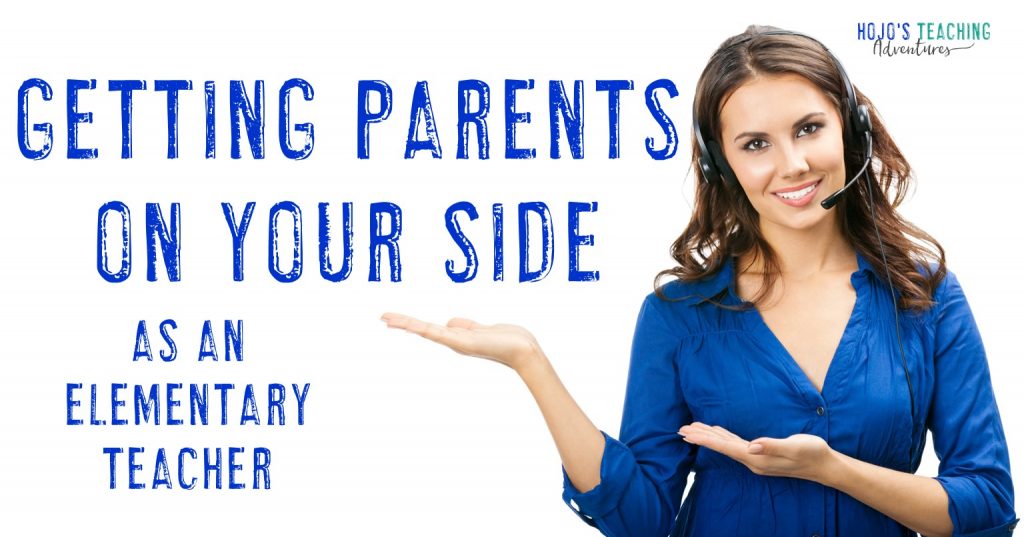Getting parents on your side can sometimes be a challenge for teachers, but it doesn’t have to be that way! I’ve taught in a variety of schools over the years, and I’ve never really struggled with parent/guardian interactions. Instead, I’ve implemented the strategies below. If you do the same, you can get parents on your side right from the first day of school!
1. Start the School Year Off Right
I don’t care what grade level you teach, there is nothing wrong with sending home a note or postcard to families before the school year starts. If that seems like a bit much to you, make sure your rules and general policies are in the hands of your students’ families within the first few days of schools. Parents that feel informed are less likely to complain later on. You already know your rules and procedures, so taking a few minutes to type them out and send home should not be a big deal. (Plus you’ll really only have to do this once. After that, you can quickly scan the letter and update it each year.)
2. Call in the First Two Weeks
Make sure to call every student’s home within the first two weeks of the school year. Yes, I realize this can be a lot of phone calls home, but it’s worthwhile! Just call to say hi. See if the note/newsletter you sent home made it, and ask if the parents or guardians have any questions. Also find one thing to compliment the student on. That’s it! The phone call should only be 2-5 minutes. This tells parents that you care about their student and that you’re a team. I guarantee having this positive phone call under your belt will help you down the road if you need to call for something more negative.
I can already hear some of you saying, “Heather, you’re crazy! I teach 50+ students!!” I hear ya! The last year I taught we had over 50 students in our departmentalized classroom. Do this instead — Call home for every student in your homeroom. Better yet, call every student in your homeroom and the students you have a feeling may be a problem down the road. This way you’re ahead of any negative talk. This first phone call should be all positive!
3. Use the Sandwich Effect
I believe this is taught in every education college across the world, but it’s worth repeating. Use the sandwich effect!! Start any conversation with parents with a positive, then state your concern, and – finally – end with another positive. I know there are students who are a challenge, but you can find something genuinely kind to say about every child in your classroom.
4. Don’t Judge
You have no idea what is taking place in the homes of your students, so don’t place judgment. If homework is not being done, it may be due to the fact that mom has to work three jobs just to keep food on the table. If notes home aren’t being returned it could be because the house has been without electricity for the week. You only get a snippet of the truth from the student, so don’t place judgment on the home. You wouldn’t want them to judge you, so don’t do it to them.
5. Be Brief, But Informative
There’s no need to call and have lengthy conversations with parents. Sometimes you just need to make a call to ensure they are up-to-speed on what’s going on. Whether as a teacher or as an administrator, I would call home to simply state the facts. Tell what happened. Tell how it was handled at school. That’s it. You don’t need to ask for more punishment to be given at home, and you don’t need to ask for any opinions on how things were handled. Be brief, but informative about whatever situation you’re calling about. This will help with getting parents on your side.
6. Be Consistent & Fair
The biggest complaint I’ve heard from parents over the years has been if my classroom management or grading system was not consistent and fair. Kids talk. Families talk. Be consistent. They will know if you’re singling their child out, and you will get phone calls. If you are consistent, they may not like what you did – but they’ll at least respect it.
While some may say it’s challenging getting parents on your side, I’ve found that following the six steps above helps tremendously! You’re not going to be perfect right out of the gate as a new educator, but start practicing these steps and you’ll feel like a pro in no time!
If you enjoyed this post, you should also check these out:
- 10 Things Teachers Should Document Daily
- Teacher Student Loan Forgiveness
- How to Rock Your Next Teacher Evaluation
And make sure you’ve received your FREE Magic Square Puzzles by signing up for HoJo’s exclusive newsletter!



Leave a Reply